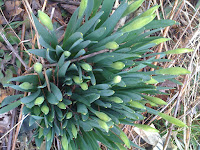 THE CORNER OF THE YEAR IS A SHARP ONE THIS TIME. Spring came to Birdland, stayed for a few minutes, and already summer seems to be settling in. Temperatures in the high 70's accelerate the budding, blooming, bursting out of all the green, growing things. In town this morning I saw a carpet of redish gold mulching the sidewalk and surrounding lawn. When I got close I saw it was the tiny florets of trees fallen from above. Did you ever look at the subtle flowers of Maples or Walnuts? Since they are wind pollinated, they don't need to show off with flashy petals or haunting scents, like, say, a Horse Chestnut or Lilac. The wind comes, or it doesn't, regardless of the wiles of Nature. And if the pollen blows in the right direction, a seed will form. Maple flowers come in minute pink clusters, like tiny bouquets, and Walnut flowers are long, limp, green catkins.
THE CORNER OF THE YEAR IS A SHARP ONE THIS TIME. Spring came to Birdland, stayed for a few minutes, and already summer seems to be settling in. Temperatures in the high 70's accelerate the budding, blooming, bursting out of all the green, growing things. In town this morning I saw a carpet of redish gold mulching the sidewalk and surrounding lawn. When I got close I saw it was the tiny florets of trees fallen from above. Did you ever look at the subtle flowers of Maples or Walnuts? Since they are wind pollinated, they don't need to show off with flashy petals or haunting scents, like, say, a Horse Chestnut or Lilac. The wind comes, or it doesn't, regardless of the wiles of Nature. And if the pollen blows in the right direction, a seed will form. Maple flowers come in minute pink clusters, like tiny bouquets, and Walnut flowers are long, limp, green catkins.Up the block was a Magnolia tree, the big pink flowers popping out of their calyxes, which lay all over the sidewalk like the empty hulls of giant pistachios, like the open mouths of birds. The shell-pink petals were still wrapped in large, conical buds, twice as long as their discarded calyxes. Yes, the heat is cooking all these flowers to an early emergence.
 |
| THE CHICKS ARE FEATHERING OUT NICELY. |
At home, crowds of Daffodils nod their heads in the breeze. Crocuses are open, too, the rich color of the yolks of my hens' eggs. Irises stand guard around the house, each leaf enfolded to make a fan growing taller every day, to form a spiky, dark green border. Lighter green day lilies emerge in a circle in the back yard like little symmetrical fountains of greenery. These won't bloom for a few months, but their vegetative parts are almost like green corsages pinned to the earth. Leaves of ghost lilies grow inches a day, and will fade even more quickly. Next to the birdbath we find red sprouts pushing out from amongst the dry, grey stalks of peonies. Everywhere we turn is a flower, or the promise of one. I find more Irises sprouting near my path to the door where I had forgotten I planted them. I will need to be extra careful when I mow in a week or two. Yes, the grass is greening up and growing fast.
The chicks are feathering out nicely, and I have been taking them outside to the little chick tractor during the day when it's sunny. It is a movable, bottomless coop so they can have access to the grass and all its varied treats. It's called a “tractor” because if you leave it in the same place for a while, a week or maybe a few days, the chickens will scratch so much that they can actually plow up your garden for you. I move it a little each day, so they can fertilize the yard evenly, but I don't let them plow up the lawn. When they get big, they will have the run of the whole yard. The grown up chickens come over to investigate and the chicks get flustered, running in a feathery flurry to get away from giant, curious beaks from above. Bit by bit they will get used to each other. Ursula noses the chicks' coop, but if you want to know the truth, she is most interested in their food. My dog could easily tear through the chicken wire in my little chick tractor, but I convince her that it's much more fun to chase a tennis ball. “Where's your ball?” I ask, and she tilts her head for a moment, and then turns toward the driveway, where we last had our game. She runs this way and that, searching, and in a few moments she returns with a faded tennis ball in her mouth. The game distracts her from the chicks and disaster is temporarily averted. She retrieves her ball again and again, and with each throw I move the game away from chicken territory. The chicks return to their inspection of their new grassy pen, and each in our own way, we enjoy the afternoon.
 |
| URSA NOSES THE CHICKENS' COOP |
 |
| WELCOME BEAUTY; CULTIVATE PEACE; BLESSED BE. |











































